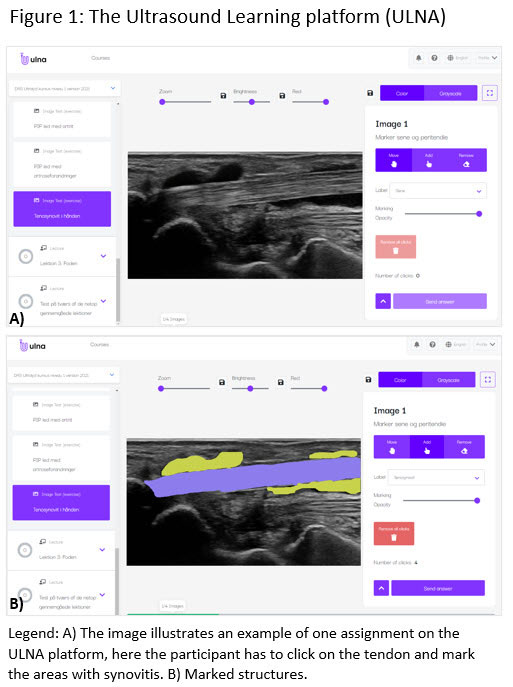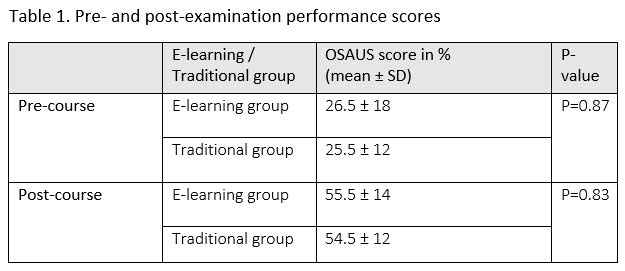Session Information
Session Type: Poster Session A
Session Time: 1:00PM-3:00PM
Background/Purpose: Musculoskeletal ultrasound (MSUS) is a complex procedure to master and requires both extensive theoretical knowledge and hands-on training. E-learning supplements hands-on training by providing the resident with theoretical knowledge. In this study, we aimed to examine how pre-course interactive e-learning effects residents’ practical MSUS performance.
Methods: We designed a multi-center, randomized controlled study following the CONSORT statement. Participants enrolled in the study were residents with no or little MSUS experience: a maximum of 100 examinations were allowed at the time of inclusion. The participants were randomized to either the e-learning group or the traditional group. One week before the hands-on course, the e-learning group received access to an online platform consisting of online lectures, interactive assignments, and MSUS practical instruction videos (figure 1). The traditional group only received standard information about the course venue and time. All participants completed a pre- and post-course practical examination of a healthy right hand and were assessed by two individual raters, blinded to the group allocation, using the validated Objective Structured Assessment of Ultrasound skills (OSAUS) tool (range 0% – 100 %).
Results: During the study period from September 2021 to May 2022, 28 participants completed the study. There was no statistically significant difference in the pre- or post-course practical MSUS performance between the group with prior e-learning and the group without; pre-course mean score in percent ± SD in the e-learning group was 26.5% ± 18, compared to 25.5% ± 12 in the traditional group (P= 0.87), whereas the post-course mean performance score in the e-learning group was 55.5% ± 14 compared to 54.5% ± 12 in the traditional group (P=0.8) (table 1). The mean MSUS experience in the e-learning group was 25 ± 31 compared to the traditional group’s 28 ± 33 MSUS examinations. The time used on the ultrasound platform ranged from 0 minutes to 553 minutes. The time used on the platform prior to the hands-on course did not correlate to the MSUS performance score pre- or post-course (Pearson Correlation pre-course 0.25 and post-course -0.07). The OSAUS assessment tool demonstrated good inter-rater agreement (0.84).
Conclusion: We found no statistically significant impact on the use of e-learning on the acquisition of practical MSUS skills. The present data indicate that e-learning cannot replace hands-on training when residents acquire MSUS practical skills. Moreover, the use of e-learning did not accelerate the learning during the course, as we did not find an improved post-examination performance in the e-learning group compared to the traditional group. Though we did not assess the impact of e-learning on obtaining theoretical skills, it has been demonstrated to be effective in previous studies.
To cite this abstract in AMA style:
Carstensen S, Just S, Velander M, Konge L, Hubel M, Savarimuthu T, Pfeiffer Jensen M, Østergaard M, Terslev L. The Effect of Interactive E-learning on Resident’s Practical Performance in Musculoskeletal Ultrasound- a Randomized Study [abstract]. Arthritis Rheumatol. 2022; 74 (suppl 9). https://acrabstracts.org/abstract/the-effect-of-interactive-e-learning-on-residents-practical-performance-in-musculoskeletal-ultrasound-a-randomized-study/. Accessed .« Back to ACR Convergence 2022
ACR Meeting Abstracts - https://acrabstracts.org/abstract/the-effect-of-interactive-e-learning-on-residents-practical-performance-in-musculoskeletal-ultrasound-a-randomized-study/


